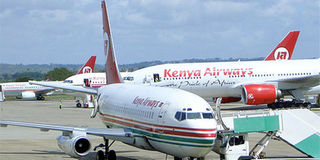Increased travel narrows Kenya Airways net loss to Sh15.8bn

KQ cited increased revenue from resumption of travel and lower costs for the performance.
The national flag carrier Kenya Airways (KQ) has halved its full-year net loss for the year to December 2021 following the lifting of international travel bans that saw the airline increase trips.
The company has recorded a 56 percent drop in its net loss to Sh15.8 billion, a significant improvement from the record Sh36.2 billion net loss the airline recorded in 2020 on the back of global travel restrictions owing to the outbreak of the Covid-19 pandemic.
This saw revenue for the year increase 33 percent from Sh52.8 billion to Sh70.2 billion as the number of passengers grew 25 percent to 2.2 million, while cargo ferried also grew 29 percent to 63,726 metric tonnes.
The firm says its performance was, however, limited by the travel restrictions that rolled on into the first quarter of the financial year as well as the Omicron variant of the virus that spread later in the year leading to the reintroduction of travel curbs by some countries.
Operations increased
The restrictions especially affected the airline’s busy Dubai and Guangzhou routes but spared its lucrative European, US and regional routes.
“The resumption in operations increased the airline’s capacity by 11.5 percent above 2020 but remained 65 percent below the 2019 pre-pandemic levels,” KQ chairman Michael Joseph said.
The increased travel saw the percentage of passengers who occupied available seats, known as the cabin factor, grow to 65 percent from 60 percent in 2020 boosted by an increase in the number of routes operated by the airline during the year.
The firm’s earnings were also boosted by a 3.5 percent drop in its total operational costs driven by Sh10 billion savings on aircraft lease rentals.
KQ, which has 36 planes out of which it has leased 19 from various lessors such as Nordic Aviation Capital and GECAS, changed the lease terms on its aircraft fleet last year, opting for hourly rates in place of fixed costs.
The carrier negotiated for a productivity-based method of payment with its lessors to avoid the fixed cost and lower the expenses involved in fleet management crucial during periods when passenger demand is low.
Economic activities
However, its direct operating costs grew 32.9 percent which the firm attributed mainly to increased operations and an increase in global fuel crude oil prices driven by the resumption of economic activities globally.
The firm is betting on new technology such as drones, flying cars and expansion of its cargo business to boost future earnings.
“There are several strategic initiatives that the company is pursuing that should help to future proof the various reform efforts that the company has instituted,” added Mr Joseph.
“Some of these include the commercialisation of unmanned aircraft technology and eVTOL, expansion of cargo and our MRO facility,” he said.
Download KQ's full-year results below:
bambani@ke.nationmedia.com


